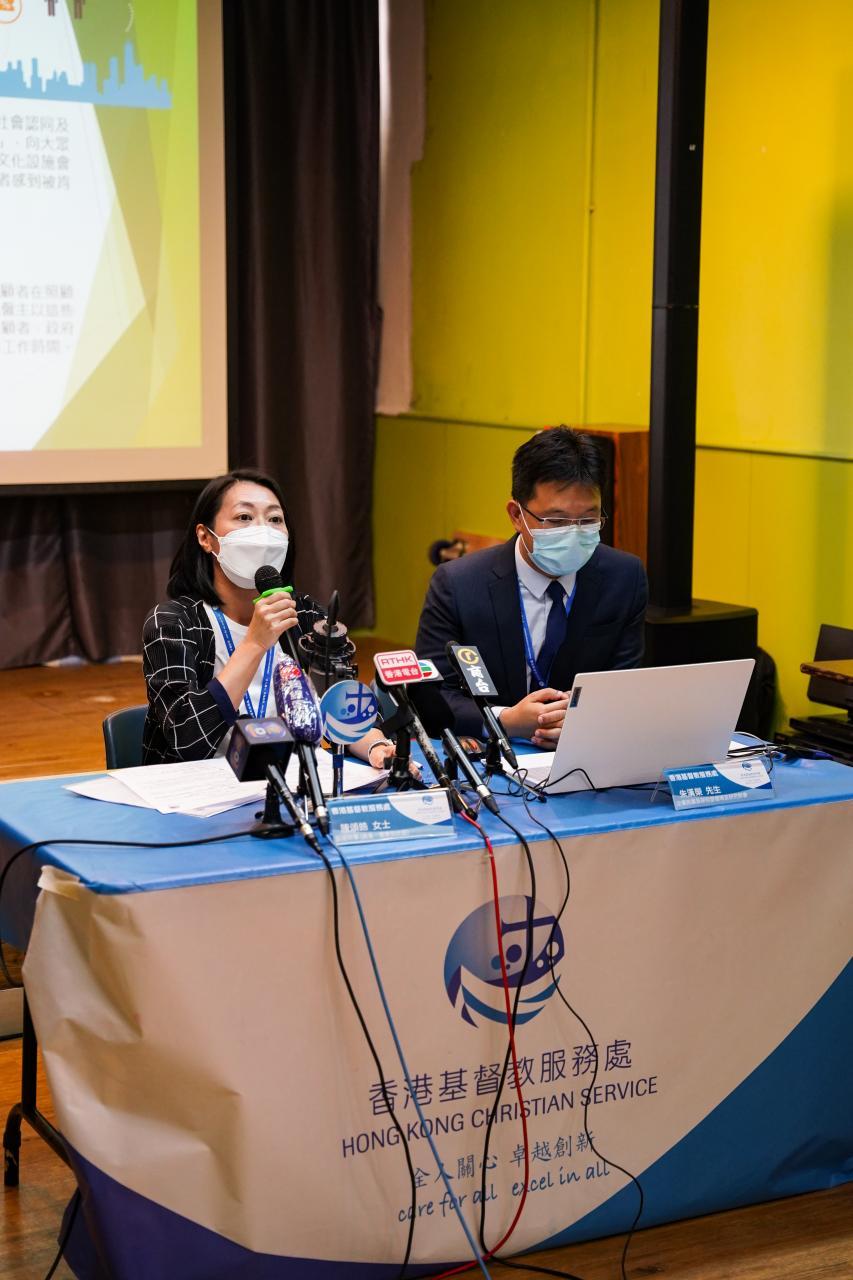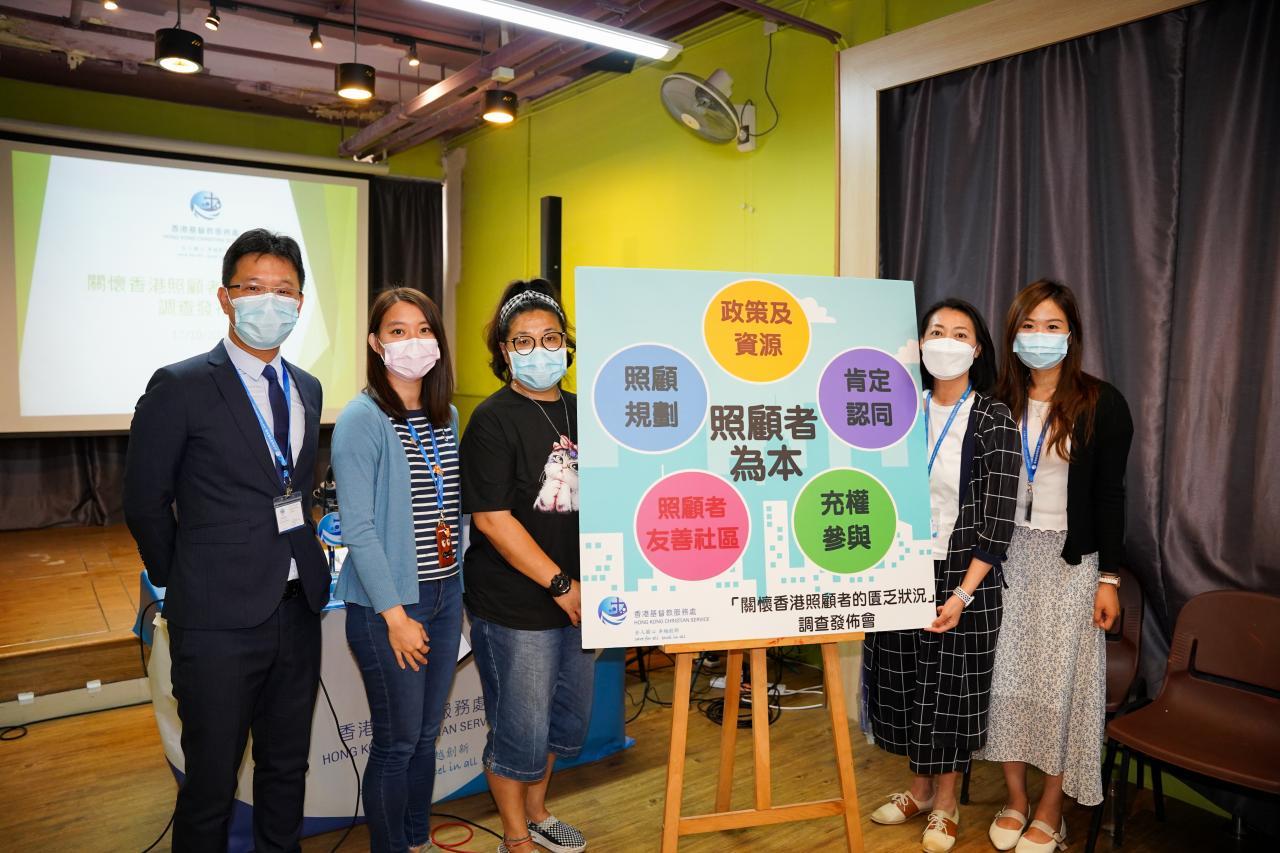Date: 17/10/2020
Caregivers play an important role in the society. They tend to put the interest of the care-recipient before their personal needs. Community members and current policies also focus mainly on the care-recipients. Caregivers’ needs are often ignored or neglected.
To better understand the situation of the caregivers and their thoughts, Hong Kong Christian Service conducted a questionnaire survey on 157 caregivers from different services (youth, elderly, rehabilitation, etc.) between December 2019 and March 2020. Convenience sampling is used in the research. We found that there are discrepancies between caregiver’s self-expectation on their role and the expectation from the society – the higher the discrepancy, the larger guilt the caregivers have.
Results and Analysis
1. The higher the discrepancy between expectation from the society and the reality, the larger guilt the caregivers have
- Over half (53.52%) of the interviewees take up the role as “caregivers” due to “family reasons” and “traditional values and thoughts”. 14.08% told us that they have to take up the role due to absence of alternative support.
- Around 18% of the interviewees got a great discrepancy between “expectation from the society on the role of caregivers” and “the reality”. Nearly 13% interviewees had a great discrepancy between self-expectation and the real situation of being a caregiver.
- Nearly one-fourth (24.20%) of the caregivers surveyed said they “occasionally”, “usually” or “always” with feeling of guilt. Around 40% (40.76%) interviewees felt guilty due to “incapable of handling the challenges in taking care of important ones”. 45.86% said they would feel guilty after giving a scolding to the care-recipient.
- Follow-up analysis on the research data found that there is statistically significant relationship between the discrepancy in one’s expectation on caregiver’s role and the guilty feeling. We shall pay more attention to the mental health of caregivers with higher discrepancy in the expectation of their role.
2. Not enough support for caregivers
- Around one-fourth (26.40%) of the caregivers surveyed said “no one can share caretaking with him/her”. 40.80% of the interviewees said “can only find one person to share caretaking with him/her”.
- 74.80% of the interviewees felt relieved to seek public and social services’ help in taking care of the important ones for them. However, 10.68% said they got no support in caregiver-oriented services, while only 42.72% said they got just one kind of such services. These figures reflected that the current support for caregivers is quite weak, and the society shall do more in this aspect.
3. The greater the guilty feeling, the greater impact on the caregivers’ daily lives
- The average score of the caregivers’ daily life participation is just a bit more than okay (score: 2.55, with “1” as the lowest score and “4” as the highest). In particular, caregivers felt it bad in areas regarding “financial freedom” (2.13), “enjoying hobbies” (2.43) and “joining sports and leisure activities” (2.46).
- Further analysis on the research data found that the greater the guilty feeling caregivers have, the more difficult for them to enjoy normal daily life which may seriously affect caregivers’ physical and mental health in the long-run.
4. Caregivers agree their rights should be valued
- Interviewees generally agreed with the items listed in the Declaration of the Rights for Family Caregivers as proposed by social service sector in other region. Items highlighted by the caregivers included “I have the right to seek others’ help when necessary” (89.68%), “I have the right to expect and fight for support for caregivers” (89.10%), and “I shall treat myself well” (87.55%). It shows that caregivers recognise their right to reasonable demands.
Sharing from caregivers
Siu-bo is a full-time caregiver who needs to take care of three children and her aged parents. She said it is always difficult for her to set her schedule fitting both the needs of her children and the parents. Sometimes, Siu-bo felt it exhausted as a full-time mother. However, she also tries to strike a balance between caretaking and enjoying leisure time, such as joining activities to learn new things when her children are at school. Siu-bo hopes that there will be designated space for caregivers to maintain their own social life and mental wellness.
Kit-jai’s father is a single parent. He needs to work and takes care of two young children, one of whom with special education needs. He said, “Male caregivers can hardly find any peer support from the community, especially during class suspension earlier this year.” He hopes the society can recognise the value of caregivers, provide more service for them to take a break, and increase support for working caregivers.
Recommendations
According to the results of the research, Hong Kong Christian Service suggests the following:
1. Advocate “caregiver-oriented” policies and support
- To regularly collect data of caregivers through population census/by-census so as to fully understand the situation and needs of caregivers, and plan the relevant services accordingly
- Labour and Welfare Bureau shall proactively consult caregivers’ opinion when conducting researches on policies about caregivers
- Evaluate existing support services from the perspective of caregivers so that the services can be more flexible and provide holistic support to caregivers
2. Create a caregiver-friendly community
- At community level
The government shall take the lead in creating a caregiver-friendly community that recognises the contribution of caregivers. For instance, the government can initiate an annual “Caregiver Day” to promote such message, and offer discounts at leisure and culture facilities for caregivers. The government can also encourage commercial sector and other stakeholders to echo the recognition of caregivers and give them opportunities of respite.
- At employment policies level
To set up a mechanism to recognise the skills caregivers obtained when taking care of important ones (the mechanism can make reference to Hong Kong Qualifications Framework). Employers of related industries are encouraged to take such skills as reference in hiring. Besides, the government shall proactively encourage employers to implement caregiver-friendly measures such as flextime and employee assistance programme, etc .
3. Enhance participation and empower caregivers
- To advocate rights for caregivers, encourage them to participate in the discussion and advocacy of related policies. The government shall also proactively consult caregivers for their opinion.
- To create platforms for caregivers to share their experiences and make their voices heard in the society.
4. Promote “early planning of caretaking”
- To arouse public awareness on the role of caregivers and changes that may happen so as to encourage early planning of caretaking

Hong Kong Christian Service found that caregivers’ needs are often ignored or neglected. Nearly one-fourth of the caregivers surveyed said they “occasionally”, “usually” or “always” with feeling of guilt. Ms Karrie CHAN, Deputy Director (Elderly, Rehabilitation & Community) of HKCS (left) said the current support for caregivers is quite weak, and the society shall do more in this aspect.

Siu-bo (middle) needs to take care of three children and her aged parents. She found it difficult to set her schedule fitting both the needs of her children and the parents. Siu-bo hopes that there will be designated space for caregivers to maintain their own social life and mental wellness.

Hong Kong Christian Service (HKCS) found that there are discrepancies between caregiver’s self-expectation on their role and the expectation from the society. The higher the discrepancy, the larger guilt the caregivers have. HKCS hopes there are more “caregiver-oriented” policies and support so as to recognise caregivers’ contributions.








